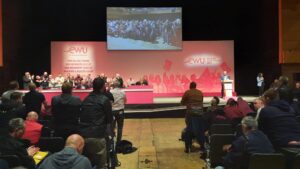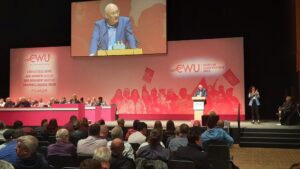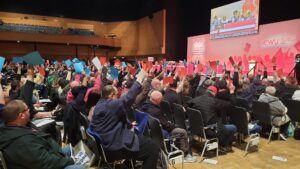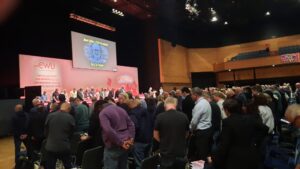CWU Conference 2024 – Day One Restructuring
Union Matters April 22 2024Prolonged standing ovation for the retiring Andy Kerr at the end of a busy day’s spirited debate over the future of our union…

“I’ve been a socialist all my life and I’ll die a socialist,” vowed Andy Kerr as he concluded an emotional farewell speech to delegates in Bournemouth yesterday.
Andy steps down at the end of this week after serving for 16 years as deputy general secretary in the Telecoms & Financial Services part of the union in the role. Looking back at his time with the CWU and its predecessor organisations, he said: “I’ve been in this union for 49 years – as a rep for most of those years – and hand on heart, it’s been an honour and a privilege.”
He was replying to a moving tribute from our general secretary Dave Ward, who had warmly praised Andy’s many years of work on behalf of CWU members as well as his efforts within the Labour Party, fighting the union’s corner as its representative on the party’s NEC.
“In my years as a Labour Party member I’ve made some good friends – as well as some good enemies, but to hell with them,” Andy told the hall, adding: “They tried to expel me in 1986 and in 1991, but they failed. I’ve always been a socialist and I’ll die a socialist.”
Restructuring – the case for change

Andy’s speech came at the end of a busy day during which delegates had discussed and voted on 22 motions, each one addressing aspects of the seven key restructuring proposals submitted to them beforehand by the NEC.
CWU president Karen Rose had opened proceedings by telling delegates that this was “a pivotal moment” for us all and, referring to the set of change proposals in front of them, she said: “You have important decisions to make, which will decide whether we can remain a standalone union.
“When we leave here, we have to be fully united in the decisions we’ve made.”
NEC policy proposals on National Structures, Branch Rebates, Health and Safety Work, Our Regions, Our Conference, Legal Services and Young Workers were the seven categories that formed the day’s agenda. And it was an agenda that sparked lively debates and some close votes.
In his opening speech, our general secretary Dave Ward out the need for change in the context of the current period, referencing the national disputes of 2022/23 involving members in RM Group, POL and BT Group. “It’s been the toughest time in history of the CWU and of our predecessor unions,” he said, “and we’re still here because of our belief in collectivism and in the CWU as standalone union.”
Turning to the business of the day, Dave said: “There has to be change. Every one of these policy proposals means change. It’s about what’s in the interests of members, representatives and the future of the CWU.
“We will restructure our union, a modern dynamic union, go forward with our new recruitment and organising strategy, and rebuild in workplaces. We are CWU and we will remain CWU if we make right decisions now for the future.
Conference gets down to business

Delegates began by debating and then approving plans to reform the structures of our national committees. The NEC reduces in size from the current 34 down to 24 and the two industrial executives – Postal and T&FS – decrease in size as well.
In this discussion, issues around the importance of maintaining the union’s commitment to equality and diversity were utmost, as well as strengthening our industrial focus.
The departures through retirement of Dave Joyce and Tony Rupa – our long serving Health and Safety and Legal Services officers respectively – were marked by warm tributes to the excellent work both have done for the union and for members over many years.
Going forward, the NEC has proposed that Health and Safety matters will become the direct responsibility of the respective industrial departments, while an appointment will be made to head up the union’s legal work as part of a reorganisation of this aspect of the CWU’s service.
Although Conference ultimately voted for this plan, several delegates expressed different views on these proposals during the debate, some of them arguing that both these positions should remain as elected national officers. Among the arguments made in favour of the NEC plan was the point that the increasing complexities of today’s employment law necessitated a specialist appointment rather than an elected officer.
Regional changes & annual conference
As part of the overall programme of restructuring and strengthening our union, the NEC has proposed reducing the current 10 regional structures down to eight. This sparked a lengthy debate, with representatives from several regions expressing concerns about the representation of different parts of the UK.
The motion agreed by conference on this will see a full nationwide consultation among branches and regional secretaries. The consultation will cover issues including regions’ roles and effectiveness, branches located within each region and the regional committee structures.
Another section of business that led to a lively discussion was the subject of annual CWU conference. One of the NEC proposals was to move to a biennial Conference schedule and an increased role for policy forums, which was opposed by most of the delegates who spoke.
Paul Garroway, from South Central Postal Branch, described the proposal as a “weakening of our democracy,” while Graham Colk, from South Wales Branch, argued in support of the NEC plan on cost grounds, saying that the costs of holding Conference every year was unsustainable.
London Engineering Branch delegate John Humphries said that, on the issue of costs, “Annual Conference is expensive, but there should be research to find cheaper venues and make other cost-reductions” and Greater London Combined Branch delegate Maria Exall asked who would call policy forums and how frequent they would be.
Maria expressed concerns that policy forums normally only gave branches the opportunity to make amendments, while adding Conference gave branches the opportunity to initiate policy.
At the end of the debate, Conference voted against the plan to move to a biennial schedule and to continue holding Annual Conference.
Remembering those we have lost

Delegates stood in memory of Jane Loftus, former CWU president and chair of the union’s Postal Executive, who sadly passed away last October. Karen Rose described Jane as “a strong and determined woman who fought against injustice and is much missed,” while Dave Ward said: “She was a remarkable traded unionist and socialist who always stood up and fought for what she believed in. My lasting memory of Jane was how serious she was in fighting injustice, particularly fighting racism.”
Conference also stood for the traditional minute’s silence in memory of all those CWU members who have passed away since we last convened.

